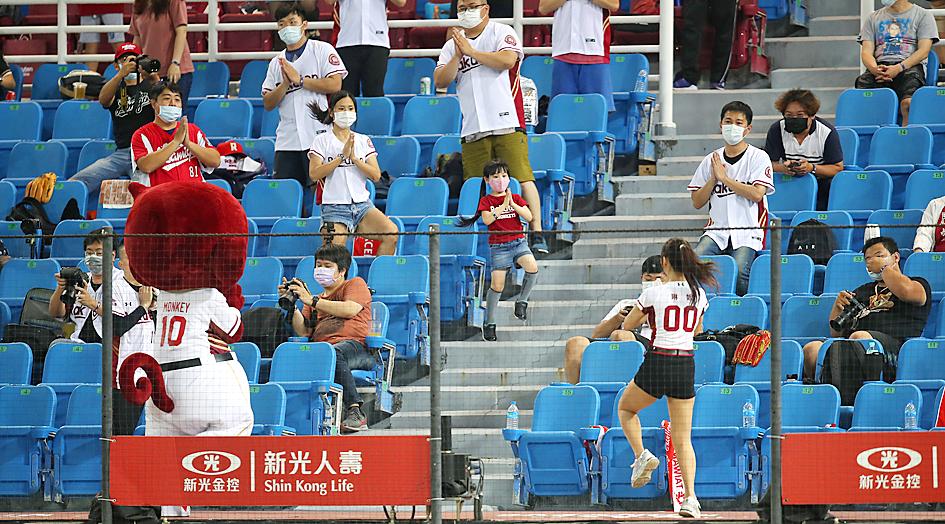The Central Epidemic Command Center (CECC) yesterday announced that its main strategy would now be to maintain strict border controls, but that it would start relaxing domestic regulations from Sunday next week.
Minister of Health and Welfare Chen Shih-chung (陳時中), who heads the center, said that there were no new confirmed cases of COVID-19 infections yesterday, and a total of 416 infected patients have been removed from isolation after treatment.
While confirmed cases continued to increase globally, reaching more than 5.5 million yesterday, there have been no domestic cases in Taiwan for 44 consecutive days, he said.

Photo: CNA
Infection control measures would continue to be strictly implemented at national borders, while large-scale easing of domestic rules would begin on Sunday next week, Chen said, adding that by then, there would probably have been no domestic cases for eight weeks.
Rules on the maximum number of people allowed at events, seat arrangements and visitor flow would be eased, but people should still practice social distancing or wear masks, maintain good hand hygiene and cough etiquette, and stay at home or see a doctor if they feel ill, Chen said.
Real-name or contact registration systems should still be enforced, he added.
As for foreign visitors, the CECC is considering establishing a mutual authentication mechanism with other countries, which would allow the 14-day mandatory quarantine period for arrivals to be shortened, depending on tests conducted in the country of departure and after arrival in Taiwan, he said.
Priority would be given to foreigners with humanitarian, medical and important economic and trade exchange needs, he said, adding that those with medical needs would be limited to emergency cases or people who have been treated in Taiwan, but have not completed their treatment.
The nation’s testing capacity would also be considered when gradually easing border controls, he added.
Meanwhile, Premier Su Tseng-chang (蘇貞昌) presided over an interdepartmental meeting attended by agencies tasked with preventing the spread of COVID-19 and reviving sectors affected by the pandemic.
The nation has performed admirably in curbing the spread of the novel coronavirus, but social activities are still restricted, while other countries are easing restrictions and the curve is flattening, the premier said.
Border controls would remain in place for the time being and would only be eased when other nations become “as safe as Taiwan,” Chen said at the meeting.
As people eagerly anticipate life returning to normal, the government is formulating guidelines and preparing to remove regulations, which would also involve issuing coupons in July to spur consumption, Su said.
Additional reporting by Sean Lin

CHAOS: Iranians took to the streets playing celebratory music after reports of Khamenei’s death on Saturday, while mourners also gathered in Tehran yesterday Iranian Supreme Leader Ayatollah Ali Khamenei was killed in a major attack on Iran launched by Israel and the US, throwing the future of the Islamic republic into doubt and raising the risk of regional instability. Iranian state television and the state-run IRNA news agency announced the 86-year-old’s death early yesterday. US President Donald Trump said it gave Iranians their “greatest chance” to “take back” their country. The announcements came after a joint US and Israeli aerial bombardment that targeted Iranian military and governmental sites. Trump said the “heavy and pinpoint bombing” would continue through the week or as long

TRUST: The KMT said it respected the US’ timing and considerations, and hoped it would continue to honor its commitments to helping Taiwan bolster its defenses and deterrence US President Donald Trump is delaying a multibillion-dollar arms sale to Taiwan to ensure his visit to Beijing is successful, a New York Times report said. The weapons sales package has stalled in the US Department of State, the report said, citing US officials it did not identify. The White House has told agencies not to push forward ahead of Trump’s meeting with Chinese President Xi Jinping (習近平), it said. The two last month held a phone call to discuss trade and geopolitical flashpoints ahead of the summit. Xi raised the Taiwan issue and urged the US to handle arms sales to

BIG SPENDERS: Foreign investors bought the most Taiwan equities since 2005, signaling confidence that an AI boom would continue to benefit chipmakers Taiwan Semiconductor Manufacturing Co’s (TSMC, 台積電) market capitalization swelled to US$2 trillion for the first time following a 4.25 percent rally in its American depositary receipts (ADR) overnight, putting the world’s biggest contract chipmaker sixth on the list of the world’s biggest companies by market capitalization, just behind Amazon.com Inc. The site CompaniesMarketcap.com ranked TSMC ahead of Saudi Aramco and Meta Platforms Inc. The Taiwanese company’s ADRs on Tuesday surged to US$385.75 on the New York Stock Exchange, as strong demand for artificial intelligence (AI) applications led to chip supply constraints and boost revenue growth to record-breaking levels. Each TSMC ADR represents

State-run CPC Corp, Taiwan (CPC, 台灣中油) yesterday said that it had confirmed on Saturday night with its liquefied natural gas (LNG) and crude oil suppliers that shipments are proceeding as scheduled and that domestic supplies remain unaffected. The CPC yesterday announced the gasoline and diesel prices will rise by NT$0.2 and NT$0.4 per liter, respectively, starting Monday, citing Middle East tensions and blizzards in the eastern United States. CPC also iterated it has been reducing the proportion of crude oil imports from the Middle East and diversifying its supply sources in the past few years in response to geopolitical risks, expanding